(RNS) — Johnnie Moore, the face of the embattled Gaza Humanitarian Foundation, the new nonprofit commissioned to distribute food aid in the war-ravaged Gaza Strip, has long said he believes Christians are called to do great things for God and to help the world become a better place.
So when the U.S. State Department asked him earlier this year to work on a new relief effort for Gaza, according to Moore, the public relations guru and onetime faith adviser to President Donald Trump jumped at the chance.
“I’m a Christian,” Moore, 42, told Religion News Service in an email. “There’s nothing more Christian than feeding people. How could I say no?”
The reasons for anyone to decline are many. In May, as GHF was beginning operations, its executive director Jake Wood, a well-respected aid veteran, stepped down, saying the aid organization’s work could not remain consistent with “humanitarian principles of humanity, neutrality, impartiality, and independence.”
GHF has since become a pariah in the eyes of the United Nations and established humanitarian groups, who accuse GHF of violating humanitarian standards while endangering civilians: Nearly 2,000 Palestinian civilians have died at the hands of the Israeli military near the GHF’s four distribution sites, all of which are in remote militarized zones. Israel has said it has banned the other aid groups and invited GHF in because Hamas was diverting food to its fighters, a claim a U.S. Agency for International Development watchdog has said there is no evidence for.
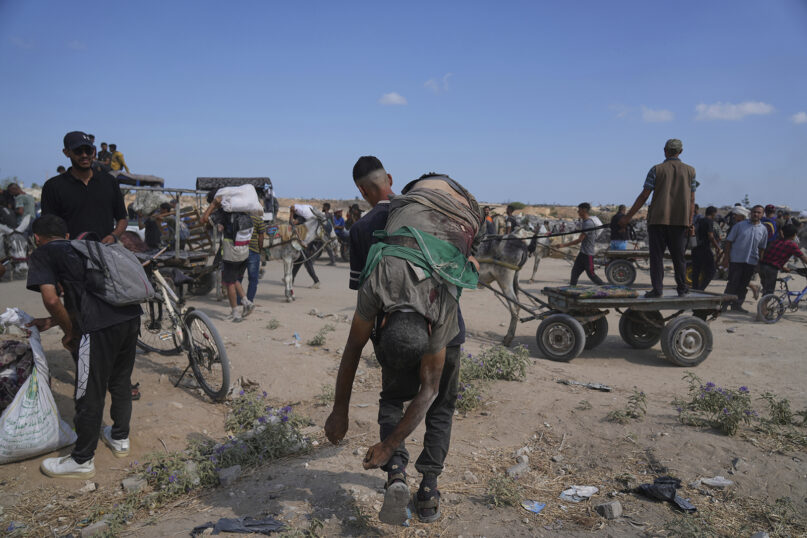
A Palestinian carries the body of a man killed while trying to receive aid near a distribution center operated by the U.S.-backed Gaza Humanitarian Foundation in Netzarim, in the Gaza Strip, Aug. 4, 2025. (AP Photo/Abdel Kareem Hana)
While the U.S. government and Israeli military have presented no evidence that Hamas has routinely stolen food from aid groups, Israel closed the border to aid vehicles between March and May and continues to make it difficult for aid groups to operate. The U.N.’s World Food Programme has said civilians have been responsible for stopping its trucks before they can reach distribution sites. The U.N. has also said that most of its trucks carrying aid have been intercepted, “Either peacefully by hungry people or forcefully armed actors.” Earlier this month, a U.N.-backed panel declared that famine has taken hold in northern Gaza.
In a scathing report in early August, Doctors Without Borders condemned the GHF program as “orchestrated killing,” rather than the “innovative solution” supporters have called it. More than 100 other aid groups, including CARE and Oxfam, have called for lifting restrictions on other humanitarian aid groups that Israel has imposed.
While Moore doesn’t oversee aid delivery himself, instead acting as the face of GHF, he has become a subject of intense criticism since taking the job. At a protest near his Virginia home in mid-August, members of the Palestinian Youth Movement waved Palestinian flags and handed out flyers accusing him of being a war criminal. Messages scrawled on the sidewalk read, “Your neighbor is a genocider.” A GHF spokesperson said Moore has been subjected to death threats.
It’s a remarkable turn for Moore, whose career has primarily involved rubbing shoulders with megachurch pastors, pro athletes and politicians. Leveraging his close relationship with the religious right icon Jerry Falwell Sr., Moore launched his public relations firm Kairos Co. in 2015 and has represented the National Religious Broadcasters, the Museum of the Bible and other high-profile clients.
But Moore has also put his religious zeal and his PR savvy in service of political causes, taking on as clients Charlie Kirk’s Turning Point USA and the Rev. Sammy Rodriguez, of the National Hispanic Christian Leadership Conference, as well as associating himself with Trump.
He met Trump, then host of “The Apprentice,” in 2012, when Moore was a vice president and spokesman at Falwell’s Liberty University in Lynchburg, Virginia. The real estate mogul-turned-reality TV star had come to speak at the invitation of Jerry Falwell Jr., who had followed his father as the school’s president. Moore got to know the future president further in 2014, after Moore left Liberty to serve as chief of staff to Mark Burnett, the producer of “The Apprentice” and a rare outspoken Christian in Hollywood.
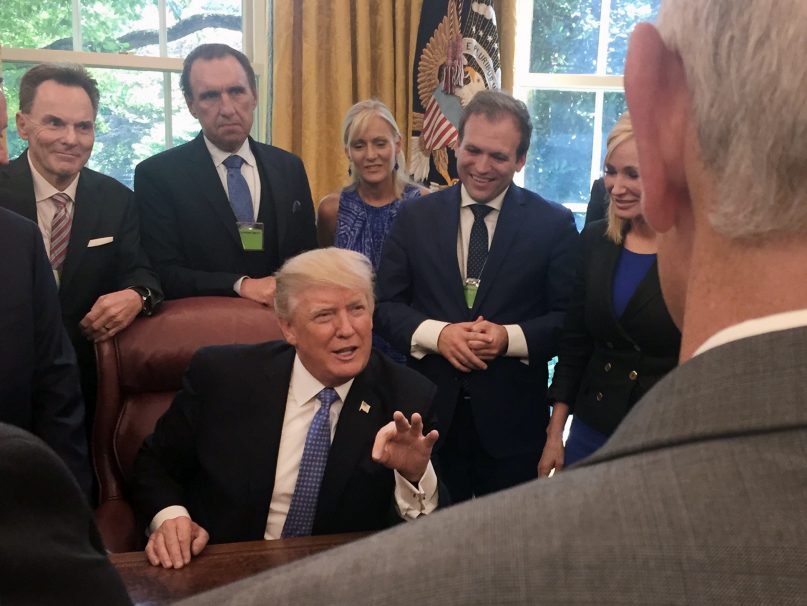
Johnnie Moore, center right, stands with evangelical supporters behind President Donald Trump in the Oval Office at the White House in 2017. (Photo courtesy of Johnnie Moore)
When Trump began his first run for the White House, Moore played a key part in rallying evangelical support for his candidacy, along with Paula White-Cain, a Pentecostal megachurch pastor and a onetime Kairos client. After Trump won, Moore became the de facto spokesperson for Trump’s informal band of evangelical advisers. When a group of the advisers visited Saudi Arabia in 2018, it was Moore who explained to the press why they had met with Crown Prince Mohammed bin Salman, then under growing suspicion of complicity in the murder of Washington Post journalist Jamal Khashoggi.
Moore’s support for Trump would be rewarded with an appointment to the U.S. Commission on International Religious Freedom, a bipartisan, independent panel that releases annual reports rating countries’ respect for religious freedom. Moore used the platform to speak out for religious minorities, especially those fleeing the Islamic State group, also known as ISIS, and persecuted Christians in China. Business and advocacy sometimes merged: Kairos later represented the International Religious Freedom Summit, organized by former Kansas governor and senator Sam Brownback, who had served as Trump’s ambassador for religious freedom.
After Moore’s two USCIRF terms ended, he continued his work as an advocate for religious minorities. Ahead of the invasion of Ukraine in 2022, he went to Israel to greet Ukrainian Jewish refugees and spoke about the importance of religious liberty. “Whether in Iraq in 2015, Afghanistan in 2021 or now in Ukraine in 2022, here’s a lesson I have learned: You don’t have to wait for governments to save lives,” he wrote in an RNS commentary that year. “You can do it.”
His support for Israel is another core commitment and a deeply held spiritual belief. “As Christians, one of our obligations is to love Israel and to love the Jewish people,” Moore told the Jerusalem Post in July, adding that he wants Christians to “do their college degree in Israel. I want Christians to vacation in Israel. I want Christians to spend a portion of their life in Israel.”
Moore is one of several conservative evangelicals who call themselves Christian Zionists and have played powerful roles in Trump’s administrations. They include current U.S. Ambassador to Israel Mike Huckabee, who like Moore has Baptist roots and served earlier in his life as a pastor. The two share an embrace of Israel as the land that God promised to the Jews in the Bible.
Author and ethicist Brandon Ambrosino, who befriended Moore as a Liberty student, said Moore’s leap from PR guru to humanitarian aid honcho showed the influence of “Doc Falwell,” as Liberty’s founder was referred to by students. “Like Jerry Falwell, Johnnie’s very charismatic,” said Ambrosino. “He thinks God has important plans for American politics, and he happens to believe that God is using him to get his plans carried out.”
In a talk in February to religious broadcasters, before joining GHF, Moore spoke about the power of pure charm in winning over critics and achieving results. “I have some really, really great friends that are totally different from me. Their politics are all different from me,” he said. “Now when people say, ‘Do you know Johnnie?’ they’ll say, ‘I disagree with everything that crazy evangelical believes, but he’s a nice guy.’”
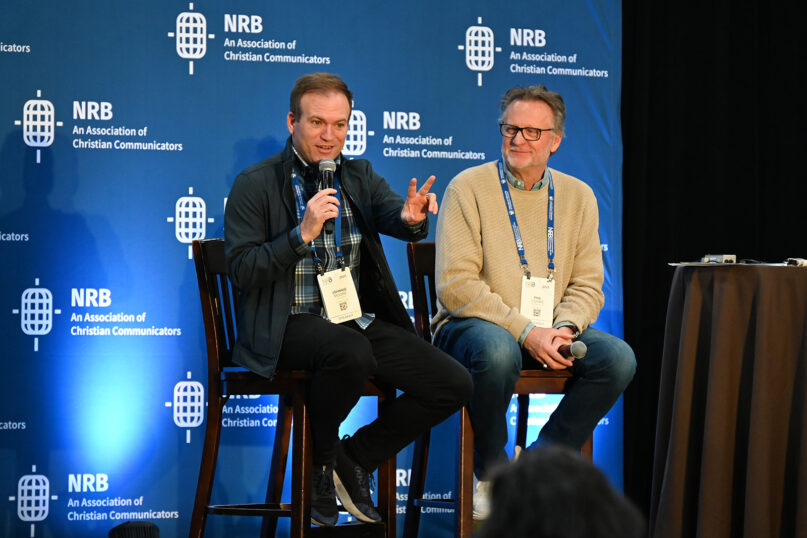
Johnnie Moore, left, speaks on a panel alongside Phil Cooke at the National Religious Broadcasters conference, Feb. 26, 2025, in Grapevine, Texas. (RNS photo/Jack Jenkins)
The Rev. Fred Davie, senior executive vice president at Union Theological Seminary, who served with Moore on the USCIRF, said he and Moore got along well despite divergent views on how to deal with religious oppression of LGBTQ people around the globe. “Johnnie’s got a good heart and a good soul and a good mind,” said Davie. “I just think he may be in the midst of things where there are forces that are so much out of his control.”
In his 2011 book, “Honestly: Really Living What We Say We Believe,” Moore details the struggles of his childhood, largely caused by his parents’ troubled marriage. But he makes clear that faith was one way the family presented a good face to the world. “Our Christianity was actually one big PR stunt that we had carefully crafted in order to look good,” Moore wrote.
At 16, Moore wrote, he was living in a basement apartment in Lynchburg, Virginia, with his mother and sister when someone sent the elder Falwell a tape of Moore preaching at a Georgia church. Soon after, an anonymous donor funded a scholarship for Moore to attend Falwell’s Lynchburg Christian Academy for his final year of high school. He went on to attend Liberty, and even before graduating in 2001, had joined the university’s staff, working in the chaplain’s office. “I owe Dr. Falwell so much,” Moore told RNS.
Along with speaking at chapel services, he oversaw the school’s Center for Global Engagement missions, which sent students all over the world on mission trips. In 2014, having become one of the youngest vice presidents at any university in the country, as well as the university’s spokesman, he left, spending less than two years as “vice president of faith content” at Burnett’s One Two Three media before starting Kairos.
In his PR work, he has often been called to defend troubled pastors and organizations such as Gospel for Asia, a missionary group whose founder, K.P. Yohannan, had spoken at Liberty when Moore was chaplain there. After it was sued by donors for allegedly mismanaging millions in donations, the group eventually agreed to pay back $37 million in a settlement.
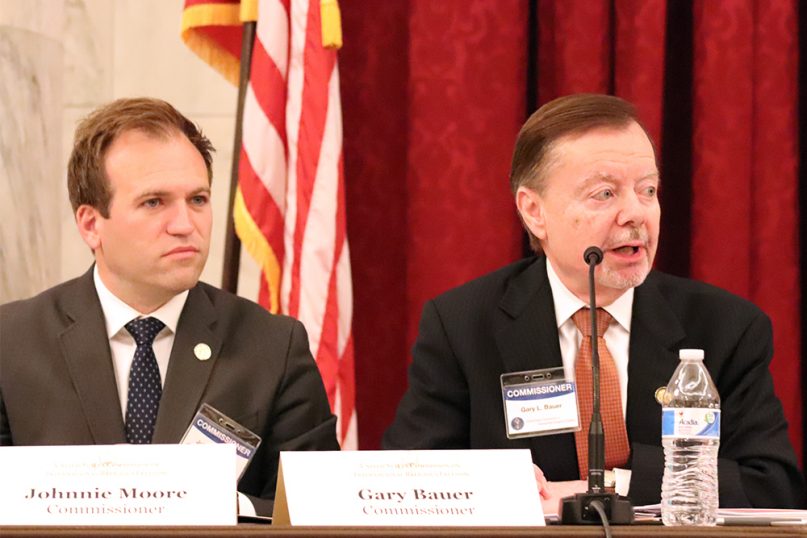
U.S. Commission on International Religious Freedom commissioners Johnnie Moore, left, and Gary Bauer speak about the 2019 annual report during a news conference on April 29, 2019, in Washington. (RNS photo/Adelle M. Banks)
Moore was embarrassed after audiotapes of his conversations with troubled megachurch pastor James MacDonald were leaked by a Chicago radio host, a former church member who had clashed with MacDonald. In that recording, MacDonald, who was eventually fired from his church for misconduct, joked about planting child porn on the computer of the publisher of Christianity Today or falsely accusing staff of having affairs after the magazine published stories critical of MacDonald. Moore can be heard laughing along in the background before trying to talk MacDonald down.
“Like all communications professionals, you make some mistakes and there are clients who you would have handled differently in hindsight,” Moore said in a recent email to RNS. “I also believe that in the same way everyone is entitled to a legal defense that people should be entitled to reputational defense.” But he defended his work for Gospel for Asia, saying the legal case against the group was “one of the most gross injustices I’ve ever witnessed.”
In his years heading Kairos, which was bought by JDA Worldwide in 2022, he became known as a crisis communications expert. At a panel in February at the National Religious Broadcasters convention, he explained strategies for responding to situations ranging from a child being injured on church grounds to allegations of sexual abuse. He encouraged listeners to “be fast” when combating narratives and ignore online criticism from lesser-known sources.
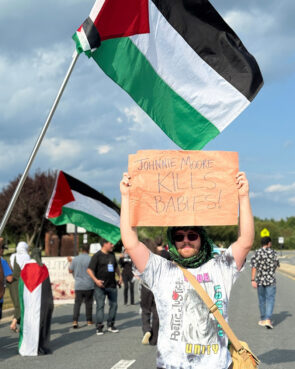
Palestinian Youth Movement members protested near the Virginia home of Johnnie Moore in August 2025. (Photo courtesy of Palestinian Youth Movement)
“We advise in the digital age that any organization should be telling their story and retelling their story on an ongoing basis,” he said. “Because what ends up happening is, if you haven’t clearly defined who you are, what you do, what your mission is, in the public domain already, when an accusation or an issue happens in the organization, whether it’s a scandal or whether it isn’t, it garners like 10 times the publicity.”
Moore, who stepped down as JDA’s president earlier this year, appears to have brought these same strategies to bear in defending GHF. He has repeatedly framed GHF as an impactful, highly accomplished organization, claiming the group has delivered more than 125 million meals while keeping aid out of the hands of Hamas, something he alleged that other aid groups, such as the United Nations, have been unable to do.
He has appeared on Sunday morning television programs, penned Wall Street Journal editorials and held meetings with Jewish groups and D.C. think tanks, pushing back at critics who claim the GHF lacks the expertise to operate a large-scale feeding operation. Its staff, he told RNS, has been drawn from other major aid organizations and has worked in more than 30 countries. GHF’s executive director, John Acree, Moore said, “has three decades of humanitarian experience, including with USAID, and has dedicated his professional life to this field.”
But his efforts have done little to blunt the criticism from the humanitarian aid sector. In June, 15 international human rights and legal organizations sent a letter to GHF urging the organization to cease operations or face the “risk of criminal and civil liability” for “aiding and abetting or otherwise being complicit in crimes under international law, including war crimes, crimes against humanity, or genocide.”
Religious aid groups have also continued to express deep skepticism of GHF’s methods. In July, religious organizations were among the 110 humanitarian and human rights groups to sign a letter calling for a new effort led by the U.N. Signers included the American Friends Service Committee, Episcopal Peace Fellowship, Islamic Relief, Mennonite Central Committee and Churches for Middle East Peace. (Samaritan’s Purse, the disaster relief humanitarian group founded by Trump ally the Rev. Franklin Graham, is one exception, having collaborated with GHF to provide aid.)
More recently, leaders of the largest Jewish denomination in the U.S., the Union for Reform Judaism, published a lengthy statement lamenting starvation faced by Gazans and, URJ spokespeople confirmed, implicitly criticizing GHF’s actions.
Muslims have been unsparing in their criticism as well. “American Muslims are deeply disturbed by how this whole process of establishing the GHF and completely sidelining all other humanitarian organizations has played out,” said Haris Tarin, vice president of policy and programming for Muslim Public Affairs Council. “We believe it is a deliberate act by the Israeli government, with its Christian nationalist allies in the Trump administration, to choke off any real aid into the strip, which would then lead to the mass displacement of the Palestinian people.”
Most damningly, Anthony Aguilar, a former U.S. Special Forces officer who worked with one of the contractors that secured GHF aid sites in Gaza, said in July that he had personally witnessed Israeli soldiers and American contractors open fire on unarmed Palestinians near GHF sites. In an interview with the BBC, he described incidents of Israeli forces firing on crowds of hungry people and tanks blasting their main guns into the crowd.
“In my entire career, (I have) never witnessed the level of brutality and use of indiscriminate and unnecessary force against a civilian population — an unarmed, starving population,” Aguilar told the BBC. “I witnessed war crimes.” He provided video of what he said were American GHF security guards opening fire, with one person being heard shouting, “I think you hit one!”
Aguilar’s account echoed an investigation by the Israeli newspaper Haaretz that quoted anonymous Israeli soldiers who said they were ordered to shoot at unarmed Gazans seeking aid, even when no threat was present.
GHF has repeatedly rejected claims of deliberate shootings, saying Aguilar was a disgruntled subcontractor dismissed for misconduct. (Aguilar denies this.) Moore told RNS without offering specific evidence that he believes Doctors Without Borders is “compromised by Hamas.” He has made similar claims about the U.N. and other aid groups, arguing they exacerbated conditions in Gaza rather than making them better. He also told RNS that GHF is not responsible for the deaths near feeding sites.
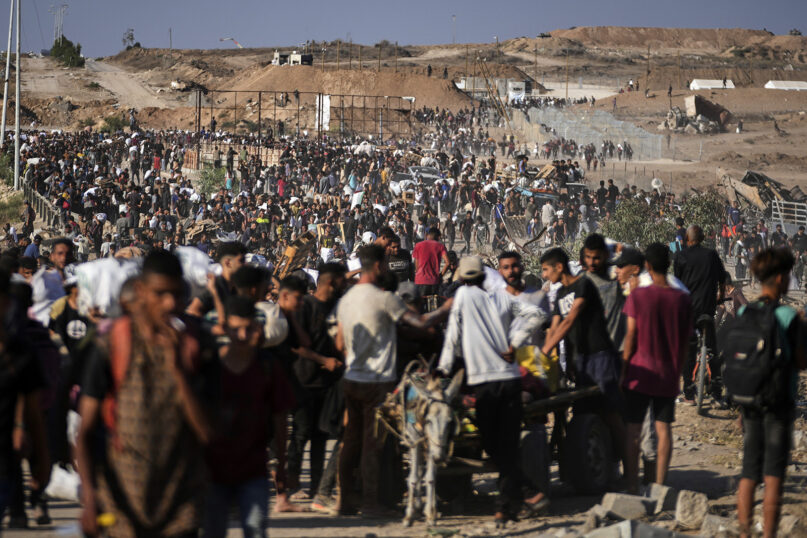
Palestinians carry humanitarian aid packages near a Gaza Humanitarian Foundation distribution center operated by the U.S.-backed organization in Khan Younis, southern Gaza Strip, June 26, 2025. (AP Photo/Abdel Kareem Hana)
Critics and supporters alike insist Moore’s involvement in the Middle East comes from a sincere place, but like Davie, they point out that the moral and geopolitical stakes facing Moore are radically higher at GHF.
“I have always found Rev. Johnnie Moore to be a person of goodwill,” wrote the Rev. Mae Cannon, executive director of Churches for Middle East Peace, in an email to RNS, “which is why I am confounded by his inability to see the incredibly problematic reality of the militarization of aid through the Gaza Humanitarian Foundation. As a pastor and Christian leader, I hope Rev. Moore will open his eyes to the reality of the ineffectiveness and devastating harm being caused by the GHF toward innocent civilians in Gaza.”
Adam Nicholas Phillips, a pastor and former USAID staffer who now is CEO of Interfaith America, has known Moore for years. He suggested the GHF faces an impossible task. Calling Moore “a sincere defender of human rights and the most vulnerable,” Phillips said that with the destruction of dependable humanitarian aid institutions, programs and partnerships, “the work of GHF was always going to be beyond challenging.”
Moore has long had a penchant for taking on “impossible missions,” said Luke Moon, executive director of the Philos Project, a pro-Israel evangelical group, who befriended Moore about a decade ago while raising money to help fund charter flights for Christians out of ISIS-controlled Iraq.
In that crisis, Moore’s skills proved essential for raising awareness and motivating people to give to the cause. That kind of awareness could be used for addressing any kind of crisis, said Moon. “He’s a PR guy,” said Moon. “He comes by it naturally.”
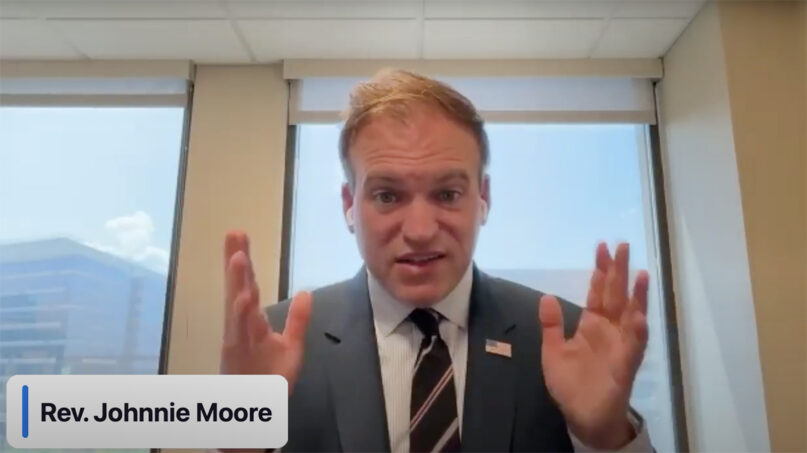
Johnnie Moore speaks about the Gaza Humanitarian Foundation during a Zoom appearance sponsored by the American Jewish Congress and the World Zionist Organization, July 22, 2025. (Video screen grab)
Moon said that working in the Middle East, particularly during the Israeli-Palestinian conflict, is a difficult but noble cause. “Sometimes the best you can do is save one, or five, or 20,” he said. Conservatives like Moore and Moon are misunderstood, Moon said, often portrayed as heartless in the face of suffering. That’s not the case, he said.
“At the end of the day,” said Moon, “both us and the head of the U.N. want fewer people going hungry in Gaza. What we are fighting about is the means to get there. That tends to be a dividing point between the left and the right — arguing over not outcomes, but means.”
Moore agreed with Moon’s assessment, saying he is “not scared to try and solve hard problems.”
“I believe if you care about something you have to try and do something about it even if it’s really hard and even controversial,” Moore said. “I can’t imagine what the Gaza Strip would look like today had we not delivered 125 million meals of food over the last two months directly to the people.”
It’s not clear how much longer Moore will stay with GHF, or who would replace him if he leaves. A spokesman said that once Moore completed “the mission the Department of State asked him to do” he would be “going back into higher education full-time.” In early August, a report from a student outlet at Pepperdine University announced Moore would head the school’s satellite campus in Washington.
Phillips said the crisis in Gaza is bigger than any one person, or single group, can solve.
“It’s time for interfaith leaders both here in the U.S. and in the region to come together and find solutions that center the emergency that’s transpired and ongoing in Palestine before it’s too late,” he said. “For too many, it’s already too late.”
Adelle M. Banks, Yonat Shimron and Jack Jenkins contributed to this report.






